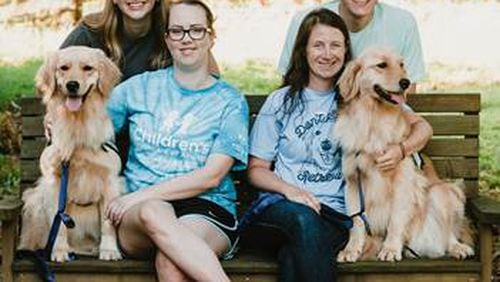Two new dogs have joined the Children’s Healthcare of Atlanta Canines for Kids team, according to a press release. The hospital now has 16 dogs therapy dogs.
After graduating from Canine Assistants camp Flo and Dory spent their first week on the job at the Egleston campus.
Flo will be working with kidney transplant, liver transplant, GI intestinal rehabilitation, and outpatient infusion patients.
Dory is going to work in the Children’s Camp program so she will spend lots of time at Camp Twin Lakes. When Dory isn’t at camp, she will be making surprise visits to Egleston and Scottish Rite. You might also catch her at the office park from time to time helping with the behind the scenes camp preparation.
On Thursday, June 21, CHOA launched its new therapy dog Instagram channel @therapydogsofchoa. In less than 24 hours, it had over 1,000 followers.
Canine for Kids is a unique Animal Assisted Therapy program at Children’s. The program began with Casper and his handler, Lisa Kinsel in Volunteer Services, in 2009. Around that time, another Children’s dog handler, Kara Klein, did a presentation at a Child Life conference in Denver nearly a decade ago, and many other hospitals started similar programs. To-date, the program has been replicated in more than 20 other pediatric or medical institutions across the U.S.
Today, the program includes 14 full-time service dogs on staff aiding the clinical teams in their daily mission to serve our patients, while stealing the hearts of parents and coworkers alike. These highly sensitive facility dogs are from Canine Assistants, a group that raises and trains service dogs for physical disabilities and other special needs. Dogs work with our providers to minimize stress of the hospital, support the overall social, physical and emotional development of the patient, reduce anxiety, provide distraction from illness and hospitalization, help patients overcome the loss of being separated from their own pets, and offer unconditional love and acceptance. The Canines for Kids program is entirely donor funded.






